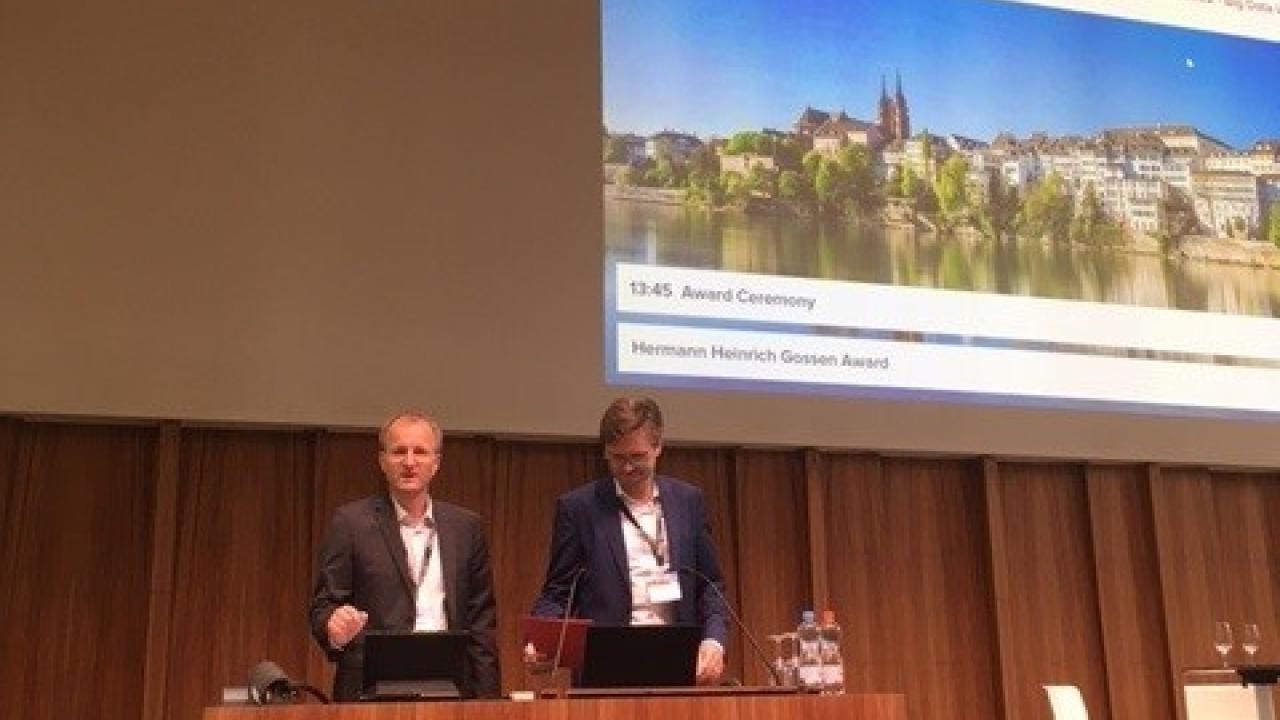Hermann Heinrich Gossen Award 2022
The Hermann Heinrich Gossen Award 2022 goes to Christian Bayer (Bonn University).

Christian Bayer was awarded the Hermann Heinrich Gossen Prize at this year's VfS Annual Conference.
The Hermann Heinrich Gossen Prize is awarded once a year by the Verein für Socialpolitik to an economist under the age of 45 from the German-speaking world for internationally recognized research achievements. The prize is endowed with 10,000 euros. The aim of the prize is to promote the internationalization of German-language economics. The main criterion for awarding the prize is publications in internationally recognized journals.
The prize is named after the Prussian lawyer Hermann Heinrich Gossen (1810 - 1858). With his work "The Development of the Laws of Human Intercourse, and the Rules for Human Action Flowing Therefrom," Gossen is considered one of the most important precursors of the modern marginal utility school.
"Christian Bayer has made numerous significant contributions to the empirical analysis of macroeconomic impact mechanisms. Macroeconomic shocks do not affect all market participants equally, nor do they act simultaneously. The analyses of models that include heterogeneous agents, developed by Christian Bayer and his co-authors, have significantly increased the understanding and quantification of the transmission of shocks," lauds VfS Chairman Prof. Georg Weizsäcker.
Christian Bayer studied economics at the Universities of Bonn and Essen and received his doctorate in the same subject in Dortmund in 2004. After spending time abroad at no less than three prestigious universities - the European University Institute in Florence, Bocconi University in Milan and Yale University in New Haven - he was appointed W3 professor in Bonn in 2008, just four years after receiving his doctorate. In addition to his teaching duties and his achievements in research, which the VfS honors with the Gossen Award, Christian Bayer has also made extensive other contributions to the professional community for many years: as a conference organizer, as a member or chairman of VfS expert committees, as a VfS representative for young researchers, and as the spokesperson of a DFG Research Training Group. In addition, he is extensively active as a peer reviewer for journals and research institutions. And: Christian Bayer is also widely known for his strength in knowledge transfer. Despite his young age, he is particularly adept at applying both model-based research and institutional knowledge to current issues in economic policy.
Christian Bayer's research contributions often deal with models with heterogeneous agents. For example, different firms are affected very differently by macroeconomic shocks, which raises the empirically important question of their different responses to a shock. In several empirical papers, Christian Bayer, for example, demonstrates the widely dispersed response of entrepreneurial investment decisions. However, the study of heterogeneity in Christian Bayer's work also relates to household responses to economic shocks. For example, an incipient recession leads to noticeably higher income risks for households, which is why some households opt for more liquid financial portfolios out of caution. This can exacerbate a crisis, as the withdrawal of funds from illiquid forms of investment also lowers aggregate investment. Significant further aspects of household heterogeneity relate to the labor market: wage fluctuations, labor supply and migration decisions, for example, vary with some household characteristics, which is picked up in Christian Bayer's sophisticated empirical analyses. His contributions are consistently innovative, and in some (much-cited) cases can be categorized as basic methodological research. His work has rightly been published in numerous leading journals and has been supported by two highly prominent 'grants' from the European Research Council, attesting to the high professional recognition Christian Bayer receives.